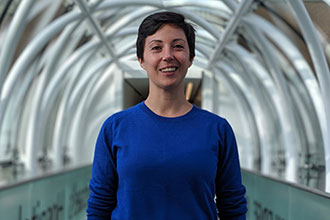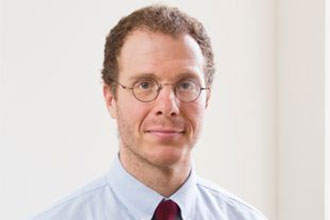Providing CARE to help the homeless in Toronto

By Arlene Howells

Dr. Jamie Robertson
On any given night in Toronto, there are 8,000 people experiencing homelessness. That’s almost the same population
as the town of Kirkland Lake: all homeless.
With the emergence of the COVID-19 pandemic, new strategies were needed to enhance protection for staff and clients
in the shelter system. To meet this need, Inner City Health Associates (ICHA), a group of more than 100 physicians serving
more than 50 sites frequented by people experiencing homelessness in Toronto, developed The COVID Alert Risk Evaluation
(CARE) project in partnership with shelter operators, Toronto’s Shelter, Support and Housing Administration (SSHA),
and Toronto Public Health. They took a population health focus to help the shelter system better serve people experiencing homelessness in the pandemic.
CARE provides data to help front line homeless shelter workers better manage services and supports. The project leverages data from a variety of sources to help shelter providers support their clients. They link people in need with people to
help them, filling gaps in the system.

Dr. Aaron Orkin
In building the project there were many ethical questions that came up, for example, around the use of personal information for the greater public good. Through the CARE project, shelter providers use the data from ICHA and SSHA to
support individuals and groups who are at an increased risk of having severe complications from COVID-19. Dr. Aaron
Orkin, Population Health Lead at ICHA notes, a program like this raises a range of ethical and operational questions that
need to be asked and answered. As we now know, when you’re in the shelter system, having somewhere to safely isolate during a pandemic is not a luxury you have. Once an at-risk person is identified solutions can be found to serve the
client and the community together.
Dr. Orkin relied on Dr. Jamie Robertson, Clinical Ethicist at the Centre for Clinical Ethics, Unity Health and her colleagues to guide him. “Bioethics explores the value and the intent behind how and why we’re using this information.
They ask inquisitive questions, reflect on our responses and provide excellent, thoughtful communications back to us.
Dr. Robertson helped us to evaluate if what we are doing is being done in the best possible way for the people we are
working to support.”
Reflecting on the various forms of support she provided to ICHA, Dr. Robertson notes that “Hospitals need to be more
proactive to cultivate and establish important relationships with community support organizations such as shelters. As we
are continuing to learn, hospitals need to expand their role to support public health directives in the pandemic.” Collaborating with groups like ICHA can help reduce the number of people who end up in a hospital emergency department for
treatment during the pandemic and more generally reduce the harms caused by the pandemic.
Dr. Orkin concludes that, “When trying to make meaningful change, we have to challenge our values and drivers for the
choices we make. Bioethicists think about that. They engage with those ideas and work with us to create better outcomes. The value they add, at both the clinical and program design level cannot be overstated.”
About St. Michael’s Hospital
St. Michael’s Hospital provides compassionate care to all who enter its doors. The hospital also provides outstanding medical education to future health care professionals in more than 27 academic disciplines. Critical care and trauma, heart disease, neurosurgery, diabetes, cancer care, care of the homeless and global health are among the Hospital’s recognized areas of expertise. Through the Keenan Research Centre and the Li Ka Shing International Healthcare Education Centre, which make up the Li Ka Shing Knowledge Institute, research and education at St. Michael’s Hospital are recognized and make an impact around the world. Founded in 1892, the hospital is fully affiliated with the University of Toronto.
About Unity Health Toronto
Unity Health Toronto, comprised of Providence Healthcare, St. Joseph’s Health Centre and St. Michael’s Hospital, works to advance the health of everyone in our urban communities and beyond. Our health network serves patients, residents and clients across the full spectrum of care, spanning primary care, secondary community care, tertiary and quaternary care services to post-acute through rehabilitation, palliative care and long-term care, while investing in world-class research and education. For more information, visit www.unityhealth.to.
